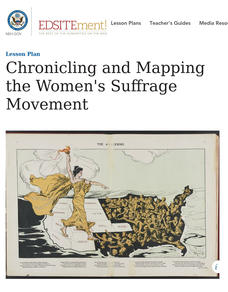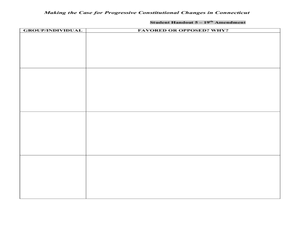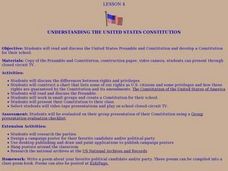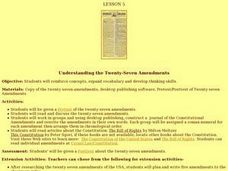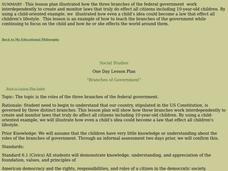Teaching Tolerance
Parallels Between Mass Incarceration and Jim Crow
Is history repeating itself? A riveting lesson examines the parallels between mass incarceration in the U.S. and the Jim Crow Laws of the past. Academics review Jim Crow Laws and compare them to mass incarcerations of African Americans....
Judicial Learning Center
Article III WebQuest
Why is Article III of the constitution so significant? Pupils discover the importance of Article III and how it relates to past as well as current events by completing Internet research using a provided handout. They learn everything...
National Endowment for the Humanities
Chronicling and Mapping the Women's Suffrage Movement
While women's suffrage is often believed to be the result of a single constitutional amendment, the effort of women to secure the vote spanned decades and continents. Using primary sources in online archives, class members explore the...
EngageNY
Fair Games
What constitutes a fair game? Scholars learn about fair games and analyze some to see if they are fair. They extend this idea to warranties and other contexts.
C-SPAN
Electoral College Pros/Cons and Alternatives
If every vote counts, why do we need the electoral college? Middle and high schoolers study the Constitutional precedent of the electoral college, as well as its place in historical and modern elections, with an engaging social studies...
NPR
Civil Rights of Japanese-American Internees
Prompted by a viewing of Emiko and Chizu Omori’s Rabbit in the Moon, a documentary about the internment of Japanese-Americans during World War II, high schoolers examine a series of documents, including the Bill of Rights and the UN’s...
PBS
President Theodore Roosevelt: Foreign Policy Statesman or Bully?
Can a negative perception of a president's foreign policy harm his or her historical legacy? A project that winds the clock back to the date of Theodore Roosevelt's death puts students at the editorial desk of a fictional newspaper....
Constitutional Rights Foundation
Plyler v. Doe: Can States Deny Public Benefits to Illegal Immigrants?
Illegal immigration is an ever-changing source of consistent controversy. A reading passage about the rights of undocumented workers and illegal immigrants—and the lack thereof—guides high schoolers into a mock trial activity. Three...
Curated OER
Unit 2: Post-Revolution: The Critical Period 1781-1878
The post-Revolutionary Period of 1781-1787, also known as the Critical Period, is the focus of a series of lessons that prompt class members to examine primary source documents that reveal the instability of the period of the Articles of...
Curated OER
Voices from Little Rock: Understanding the Civil Rights Movement through Primary Sources
As part of a study of the Civil Rights Movement, class members examine documents associated with the Little Rock Nine, the Brown v. Board of Education ruling, the 14th and 15th Amendments to the US Constitution, and chapters from Melba...
Core Knowledge Foundation
A History of the United States
This 262-page Core Knowledge teacher guide presents an overview of the two-volume History of the United States program designed for middle schoolers. The guide includes information about the learning strategies used, a pacing guide, the...
Curated OER
Rights and the Wyandotte Constitution
Students use graphic organizers to analyze the Wyandotte Constitution. They read and discuss the Wyandotte Constitution, identify the civil rights granted to the people of Kansas and consider exceptions based on gender and race.
Curated OER
Judges in the Classroom Lesson Plan Classifying Rights From Various Constitutions
Fourth graders compare the constitutions of five Pacific Rim countries. In this constitution comparison lesson, 4th graders work with a visiting judge to find similarities and differences in the constitutions of five countries. They...
Curated OER
American Focus on World Constitutions
Ninth graders describe essential components of a constitution and cite cultural factors affecting international law-making.
Curated OER
Making the Case for Progressive Constitutional Changes in Connecticut
Students take a closer look at Constitutional Amendments. In this Progressive Era lesson, students discover how the amendment process works and then examine 4 amendments proposed during the era in Connecticut. Students research primary...
Curated OER
Understanding the United States Constitution
Students discuss the United States Preamble and Constitution. In this United States government lesson plan, students discuss the differences between rights and privileges and construct a chart that lists some of our rights as citizens....
Curated OER
The Wyandotte Constitutional Convention: The Issue of Suffrage
Seventh graders discover details about the Wyandotte Constitutional Convention. In this Kansas history activity, 7th graders tackle civil rights concerns as they draft persuasive speeches to secure the rights of young voters in the state.
Curated OER
The Constitutional Convention
Learners simulate the Constitutional Convention. They describe how the members of the Constitutional Convention might have felt as they gathered and began the arduous and memorable task of writing the United States Constitution .
Houghton Mifflin Harcourt
The Progressive Era: Muckrakers
Using Upton Sinclair's The Jungle, guide your class in the process of identifying unknown terms using context clues and formulating text-based answers. The lesson plan includes a useful worksheet incorporating scaffolding questions on an...
Curated OER
Understanding the Twenty-Seven Amendments
Students use the Internet to learn about the Constitution. In this Constitutional Amendments instructional activity, students read and discuss the twenty seven amendments and work in groups to rewrite the amendments in their own words. ...
Curated OER
Understanding Procedural Justice
Students analyze procedural justice by identifying unfair decisions by ruler in play, stating procedural guarantees that a Bill of Rights should include, and comparing their list of guarantees to those provided by the U.S. Constitution...
Curated OER
A More Perfect Union
Fourth graders complete a unit of lessons on the development of the U.S. government. They examine the main ideas of the Declaration of Independence, develop a class translation of the preamble to the Constitution, create a flow chart,...
Curated OER
Federalist 47
Students will analyze and evaluate political propaganda. In this lesson on the Federalist movement, students will examine the Federalist papers and analyze the Anti-Federalist argument mage against constitutional ratification. This...
Curated OER
Branches of Government
Students explore the three branches of government. In this government and U.S. history lesson, students listen to a story about a boy who attempts to sponsor a bill to ban cartoons. Students interview three teachers who each represent...




